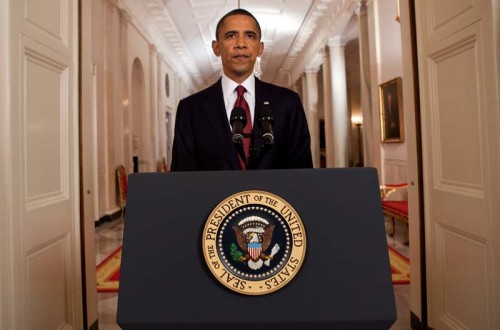
Osama Bin Laden is no more. The latest Afghan war assessment notes frangible, delicate progress, but progress nonetheless. Commanders returning from Afghanistan cite real and substantial advances in the areas for which they were responsible, and even the newspapers give the counterinsurgency campaign in Afghanistan some chance for success. The President names a new national security team well-suited for the responsibilities they are about to undertake, the CIA managed an intelligence operation that constitutes a robust success in the usual sea of anti-Agency criticism, the Congress seems to be willing to compromise in the way that the founders envisioned to produce responsible policy and budget choices. American credibility abroad is surging, however slightly, and the President, in a time of crisis, acted presidential by signing a risky covert action finding authorizing the bin Laden raid. A time of tempered American triumph and unbridled unity? Hardly.
The ink was barely dry on the newsprint describing the special operators’ successes in the bin Laden raid before the pundits started attacking the President and his team. Rush Limbaugh: “"I, me, my — three of the most used words in President Obama’s media appearance last night. Not a single intelligence adviser, not a single national security adviser, military adviser, came up with the idea … not one of them … according to Obama, had the ability to understand the need to get DNA." Washington Times columnist Brett Decker: “He used the words “I,” “me” and “my” so many times it was hard to count for such a quick message. Not only is this consistent with his view that everything is about him, it also reflected the reality that this president is weak and perceived by the world to be a lackluster leader who has undermined American power. He needs to grab any opportunity he can to make himself believable as a commander in chief.” Conservative columnist Laura Ingraham, on Twitter: “He should have thanked GWB, not reminded us OBL escaped…BHO: ‘America can do whatever we set our mind to’ … like keep spending according to my budget and raise the debt ceiling!" Even this author’s Facebook circle of friends is abuzz with criticism of the President, deflecting credit to “the troops” and accusing the President of just signing a piece of paper and sleeping in his comfortable White House bed.
Killing Osama bin Laden should send a strategic signal to the world of American unity, relentlessness, diligence, and resolve to defeat radicalism, ensure American physical and economic security, and support freedom and democracy the world over. America’s triumphs in this endeavor depend in part on success in the battle of the narrative – coordinated communications on western, progressive values as a competing vision to the repression inherent in radicalism and authoritarianism. The narrative is undermined by disloyal attacks on the President and his team – a President who, in a time of crisis, acted presidential. To be sure, if the covert action he authorized personally had failed, like Desert One in 1980 or the Bay of Pigs in 1961, the responsibility would hang around his neck like an albatross.
After FDR’s “Date of Infamy” speech to a joint session of Congress, the members gave the president a standing ovation, leading Presidential advisor Samuel Irving Rosenman to observe: “It was a most dramatic spectacle there in the chamber of the House of Representatives. On most of the President’s personal appearances before Congress, we found applause coming largely from one side—the Democratic side. But this day was different. The applause, the spirit of cooperation, came equally from both sides…The new feeling of unity which suddenly welled up in the chamber on December 8, the common purpose behind the leadership of the President, the joint determination to see things through, were typical of what was taking place throughout the country.” Unity across the political spectrum in the face of a grave threat: what a novel concept.
The future will tell the long-term consequences of killing bin Laden – will it inspire retributive attacks or cause a leadership vacuum that leads to increased violence as competitors contend for status? Will it drive a stake in the heart of al Qaeda’s organization and philosophy by demonstrating the futility of Islamism? Can the west offer a better alternative in the battle of the narrative by demonstrating harmony and civilized conduct in the conduct of our political affairs? Or are we signaling that not even a tactical triumph over evil incarnate is enough to bring American together for more than one news cycle? Instead of turning reflexively partisan, American society might consider, if only for a short while, setting aside partisan biases and celebrating an unbridled success.
Image: BARACK-OBAMA-e1304445532275.jpg
